Ethan Allen is a Revolutionary War hero who was a general in the Continental Army, a British prisoner of war, and the founder of the legendary Green Mountain Boys.
Childhood
He was born on January 21, 1738 in Litchfield, Connecticut. He was the first child of Joseph and Mary Baker Allen. Shortly after he was born, they moved to Cornwall. His father was on a quest for religious freedom, and believed that he’d found it in the frontier land of Cornwall. In Cornwall, Joseph and Mary had seven more children, all of whom survived to adulthood.
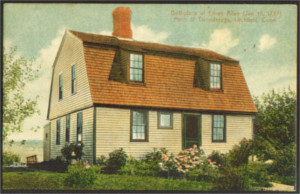
This postcard depicts the birthplace of Ethan Allen in Litchfield Conn.
Ethan’s passion for philosophy emerged and blossomed, most likely from his father’s religious passions. As a young boy, Allen could quote many verses from the Bible and loved to argue their meaning with the adults who came by.
Not much other than that is known about his childhood. He grew up in Cornwall, which was frontier land, so Ethan would have learned a lot about hunting, fighting, growing crops, and learning to survive off of your immediate surroundings. By the late 1740’s, the frontier finally started to resemble a town.
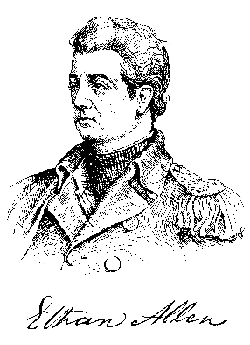
Young Ethan Allen
As a young man, Ethan studied under a minister with the hope that it might help him get accepted into Yale. In the middle of his studies, his father died and he abandoned his schooling and went to be with his family. After his father’s death, he joined the army, but it was not long before his time was up and he was back in Cornwall. There he met Mary Browson. After a very short courtship they were married, and to support his family, Allen took part-ownership with his brother Heman in an iron furnace in Salisbury. He and Mary settled in Cornwall at first, but a year later, the trips to Salisbury were too much, so they moved to Salisbury with their baby girl. He bought a small farm and kept developing his iron business.
His iron business began to cost him a lot of money. At first he financed it by selling a large sum of his land, but after that proved to not be enough, he sold his share in the business to Heman. His marriage was in bad shape; Ethan felt he did not know Mary well enough before he married her and their personalities clashed. He was miserable with her. Mary was very critical and complained a lot. She was also unable to read and write and could not enjoy his love of literature and learning. Ethan felt that she was very focused on the rules of religion, and he questioned everything and wanted to discover a relationship with his creator for himself. He loved to be very flamboyant with his beliefs and argue his views on religion. However, Ethan did not abandon the mother of his children, and he stayed with her until she died many years later.
During those years, he was introduced to the wrong side of the law. This became a recurring aspect in his life. He was first brought to court after his neighbor would not keep his pig from wandering onto Allen’s land and destroying his crops, Ethan and Heman seized the beast and served it to their families for dinner.
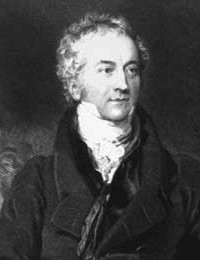
Thomas Young was a noted physician, physicist, and close friend of Ethan Allen. | Photo courtesy Library of Congress
The neighbor was very angry and the courts made Allen pay a fine of 10 shillings to replace the pig. His next visit to the court, Allen had given himself a smallpox immunization without the permission of the town selectman, which was against the law at the time. Allen protested that every man’s safety should be up to himself, not the government. He was also fined for this.
While he was in Salisbury, he ran into Thomas Young, a doctor living on the border of New York, quite near Salisbury. The two became really great friends rather quickly. Young taught Allen a great deal about philosophy and political theory, and Allen taught Young about life in the frontier and the appreciation of nature. Shortly after, they decided to start writing a manuscript together. The writing went quite well, until Young had to move away in 1764 and took the manuscript with him. Ethan did not find it until years after Young had died, at which point he fleshed it out, edited and published the book he called Reason: the Only Oracle of Man.
The Green Mountain Boys
For the next few years, history loses sight of Ethan Allen. There is no new documentation on him until late April of 1775. After the battle of Lexington and Concord, a military group called on Ethan. They were planning on capturing Fort Ticonderoga and they wanted to know if he would help. Allen said that he felt a patriotic obligation, but others suggested that he may have seen it as a good way to make up for the run-ins with the law he’d recently had. Whatever his reasoning, Ethan Allen began rounding up the Green Mountain Boys. On May 2, 1775 Ethan Allen and the Green Mountain Boys met up with a group of soldiers from Massachusetts and Connecticut in Bennington. Allen and the other officials planned their attack on Ticonderoga for May 10.
Everyone voted, and Allen was dubbed in charge of the attack. On May 9, however, General Benedict Arnold showed up without warning, and asserted his right to command. The men said they would not follow Arnold, and they would only fight if Allen led the fight. Ethan Allen went to General Arnold and suggested they lead the attack together. At 2 o’clock the next morning, Arnold, Allen and the soldiers loaded into boats and headed across the lake to Fort Ticonderoga. Only 83 soldiers made it over before Allen and Arnold decided to attack for fear that dawn would take away their cover soon. As soon as the attack took place, Ethan headed straight for the Captain’s quarters.
The Captain’s second-in-command had aroused him at the first sight of attack, and the captain was dressing in the back. His second, trying to stall for time, demanded “In whose authority do you take this fort?!”
Allen, believing that he was talking to the captain, announced: “In the name of the Great Jehovah and the Continental Congress!” The Captain then came out fully clothed and surrendered his sword to Ethan Allen. Ethan Allen and Benedict Arnold successfully took Fort Ticonderoga without firing a single shot. This was the first win for the American Continental Army.
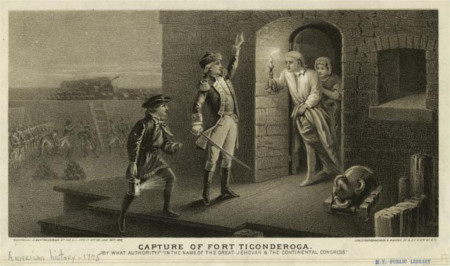
This is a rendition of Ethan Allen and Benedict Arnold capturing Fort Ticonderoga. | Public domain image, courtesy of Wikimedia Commons
After their success at Fort Ticonderoga, Ethan Allen and the Green Mountain Boys were called on for many other battles. They became a small legend around the Northern regions of America. Later, the Boys became discontent with their chain of command, and held a vote to instill new leadership. Ethan Allen was not elected to any position at all. The Boys were most likely tired of Allen’s egotistical behavior after their success at Fort Ticonderoga, and their growing fame around the country. Allen was distraught by the rejection, however most people around him thought it would be good for him to reduce his ego.
Prisoner of War
Starting on September 8, Allen and Massachusetts Major, John Brown, were sent out on a series of recruiting trips. They were very successful in the sense that they had many men sign up for the American army. However, while they were out on one of these recruits near New York, Ethan and several of their soldiers were captured and taken as prisoners by the British.
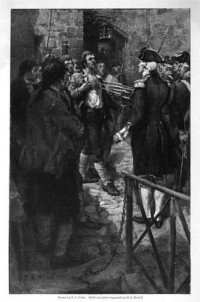
This is a print of an engraving depicting Ethan Allen being held captive before Captain Prescott in Montreal, 1775. | Public domain image, courtesy of Wikimedia Commons
They were kept on a few different British ships before they were sent to England. The circumstances were harsh and filthy, and they were made to endure many hardships. A short while after they’d been in England, King George III decreed that all American prisoners were to be held in America and treated as prisoners of war. The next day, Allen was back on a ship on his way to America. During their stay in Ireland on the way back, a group of Irish men heard of the famous Ethan Allen being held on the ship, and took up a collection of clothes and supplies for him and his men.
After that, he was held on a ship outside of New York for several months. During his stay, the captain of the ship entertained a visit from the governor of New York. Allen reports that while he was on the ship the governor looked directly at him, and pretended not to recognize him, but it is very likely that he actually knew who Allen was and chose to leave him there.
After a while, the prisoners were moved on shore to New York, and Allen (being considered an officer) was afforded a limited parole. During his time in New York, he received news that his son had died from smallpox. Devastated, Allen wandered off and was arrested by the British for breaking his parole. He was put in solitary confinement and all comforts previously afforded him were taken away.
Politics
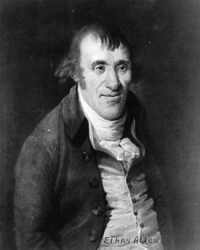
Ethan Allen, later in life
Allen was finally released to General George Washington on May 14, 1778, after three years of imprisonment. He arrived at home on May 25, only to find that his closest brother Heman had died one week before, and his brother Zimri, who had been taking care of Allen’s family and farm, had died the spring after Allen’s imprisonment. Ethan was really hit hard by the news and had a lot of trouble coping with the loss of his two brothers and his son. A few weeks later he traveled to Bennington to check in with the American army. His visit was highly anticipated and he was met with all the glory and honor deserved by a war hero.
There he learned of the Declaration of Independence and The US Constitution. This relit the flame in Ethan, and he was excited to start working on politics again. He spent the last years of the Revolutionary War fighting the political side of things.
After his unhappy wife died in 1783, Allen married Fanny Montresor Brush Buchanan. Allen was very happy with Fanny. She took good care of him, and supported him in all of his passions. He was woven in with politics until the day he died on February 11, 1789. Fanny supported him in all of his politics and studies because it was what made him happy, and Allen died a happy man because he had a wife who loved and cared for him very much. Even though Allen did not get to spend very many years with Fanny, she was truly the love of his life.


